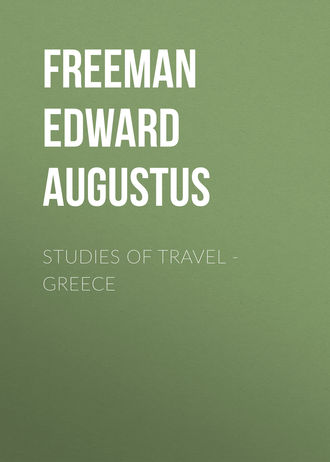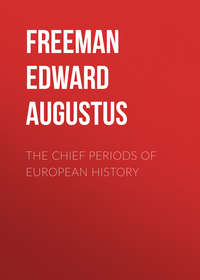 полная версия
полная версияStudies of Travel - Greece
If Scheriê really be Corfu, this may seem a most unexpected route to Athens, and yet it is hardly more wonderful than the route by Syra by which the modern traveller often actually goes. In history the first appearance of Marathôn is when Peisistratos lands there on his return from exile. The second is when the son of Peisistratos led the Persian host thither, as a fitting place for the use of the cavalry which after all they seemed not to have used. No battle in history has been more minutely examined, and that in some cases by men who united technical military knowledge with a thorough knowledge of the country. Colonel Leake, to mention only one inquirer, has done all that the union of both qualities could do, though one is amazed at his constantly referring to Herodotus as a contemporary writer. Yet, after all his labours, after all the labours of Mr. Finlay and others, everybody complains that the narrative of Herodotus is unsatisfactory. The comments of Dean Blakesley strike us as among the most acute that have been made. One may doubt whether Herodotus had ever been there; he certainly shows no knowledge of the ground. He makes no mention of the marshes which form so marked a feature in the character of the Marathônian plain. The marshes lie between the sea and the fighting-ground, as the fighting-ground lies between the marsh and the mountains. The marsh is not only not mentioned by Herodotus, but his account seems almost inconsistent with its existence. But Pausanias saw the picture in the Poikilê which showed the Persians falling into the marsh. It is like appealing to the Bayeux Tapestry from the later accounts of the battle of Senlac. Pausanias, though he lived so many ages after, was in this way really nearer to the time than Herodotus. The picture commemorated the fact; Herodotus tells the story as it had grown up a generation later. By that time, as Dean Blakesley says, the story had come under the operation of the law by which “popular tradition rapidly drops all those particulars of a battle which evince strategic genius, and substitutes for them exaggerated accounts of personal bravery.” Miltiadês, as a good general, took advantage of the ground, and largely owed his success to the nature of the ground. Popular tradition made everything be done by sheer hard fighting.
In short, almost every detail of this memorable fight seems shrouded in uncertainty. It is hard to fix the exact position of either army, and the very name of Marathôn has perhaps shifted its place. The site of the old town seems quite as likely to be, not at the modern Marathôn, but, as Colonel Leake puts it, at Brana. Yet, amid all this doubt, there is essential certainty. Of the work that was done that day, of the general site, there is no doubt, and the most living and speaking monument of all is there to bear its witness. We stand, not, as the poet puts it, on the Persians’ grave, but on the mound which covers the ashes of the men of Athens who fell that day. Within the space between the bay with its blue waters and the hills which fence in the plain, the fate of Europe was fixed. We stand on the mound; the eye passes over the hills, from Probalinthos to the cape of Kynosoura. We look on the older and the newer candidate of the name of Marathôn; we look on the hill where older legends fixed the home of Pan, and where the later name of Drakonera speaks of some older or later dragon myth. We know that it was within these bounds that the might of Asia was broken by the force of two Hellenic cities. Standing on that mound, instead of dreaming, as the poet dreamed in the days of enslaved Greece, we may call to mind how, in the cycle of human things, another triumph of Europe over Asia was won on the same spot, and if there be, as other poets tell us, two special voices which call to freedom, no spot could be better chosen for the work that was done there than the Marathônian plain. Once that land was said to be
Unchanged in all except its foreign lord.Now the foreign lord is gone, and for the rest no change is needed. The mountains are there, the sea is there, and, almost as imperishable as themselves, the mound of the fallen heroes is there also. At no great distance from the mound, some stones remain which are held to mark the separate monument of the leader of that day’s battle. Standing there, by the grave of Miltiadês, we think of that day only. On the plain of Marathôn, we will not think either of Paros or of Chersonêsos.
While we write, perhaps no inopportune moment, the news comes that Greece has lost the last and the noblest of her later heroes. The man of other times in whom all his countrymen trusted — the man before whom the chiefs of contending parties could lay their jealousies aside — is taken away from his country in the moment of her utmost need. One tie which binds us to the past is rudely snapped, when the last of the heroes of the past, the last of the ἡμιθέων γένος ἀνδρῶν, passes away from the work to which his county had again called him. After a life of ninety years and more — a life in which the severest of censors, whose scourge spared neither Greek nor Englishman, could not find a single flaw — the hero of the fire-ships is no more. The name of Constantine Kanarês is added to the same roll of departed worthies as Miaoulês and Botzarês, as Church and Hastings. And in the long list of men who for so many ages have done honour to the Hellenic name, among the chosen few whose glory no speck tarnishes, along with Phormiôn and Kallikratidas, men of his own calling and his own element, the pen of history will engrave no nobler name than the name of him who has just gone, of him who has as truly died in the service of his country as if he had fallen fifty years back, like Kynaigeiros himself by the shore of Marathôn.
The Saronic Gulf
Travelling in Greece has in some measure to be done backwards. The stranger who reaches Athens, as it will often be convenient to reach it, by way of Syra, and who does not mean to cross the bounds of the Greek kingdom, will naturally take Athens on his way homewards. The voyage from Syra to Athens is a voyage made from the rising to the setting sun. In the like sort Athens itself is the practical centre for many points which lie to the west of it, and which geographically form further steps on the return journey. To a traveller of the age of Pausanias, one of the earliest of antiquarian travellers in the modern sense, Athens might have seemed a strange centre for a journey in the Argolic land, with Mykênê as its main object. Mykênê was in his day as desolate as it is now, but Argos and Corinth were in a very different case. In his day Argos and Corinth were united by a carriage road, as there is hope that they may before long be united again. The sea was then less thoroughly the highway of Hellas than it had been in earlier times, or than it has become again in later times. Now the traveller who has not a frame of extra hardihood will most likely look on Mykênê and what naturally goes with Mykênê as an excursion to be done from the capital, an excursion as great a part of which as possible is to be made by water. That is to say, the most natural approach to the Argolic land will be to most travellers by sea from Peiraieus to Nauplia. The traveller will thus begin his researches with one of those charming voyages among islands and peninsulas which form so special a feature in Greek travel. The voyage from Peiraieus to Nauplia strongly brings out some of the characteristics of Greek geography and history. As Sulpicius remarked long ago, famous cities lie close together. We better understand the nature of Greek politics and Greek warfare when we fully take in the fact that so many of the contending powers lay within sight of one another. This feeling comes strongly into the mind when we look down from such a point as the hill of Brescia and see the commonwealths of Lombardy grouped as it were in order before us. But there is a wide difference between commonwealths thus grouped, almost as it were in regular array, marked each by its tower rising from the boundless plain, and commonwealths the site of each of which forms a marked natural feature, an island, a promontory, an inland hill. We see why the duration of the Greek commonwealths was far longer than those of Lombardy, and why they were not in the same way easily brought together under the hands of a few powerful lords. Mr. Mahaffy, who occasionally arrives at untrustworthy conclusions on things which he has not sufficiently studied, but who yields to few in keenness of observation on the things which he has really studied, has some good remarks on the geographical separation between state and state which was brought about by the physical features of the country, above all by the mountain ranges. Athens and Thebes were, as modern states go, very near to one another, but Athens and Thebes had real difficulties in getting at one another. The sea indeed was, whether for peaceful or for war-like purposes, not a barrier but a highway, but just as the physical position of the Greek commonwealths gave them a more distinct national being, so the long and winding coasts of the islands and peninsulas on which so many of them were placed gave them, near as they lay together, an actual extent of territory altogether out of proportion to their nearness. Thus, short as the life of the commonwealths of ancient Greece seems to us, it was at least far longer than the life of the commonwealths of mediæval Italy. Of the last, the few that survived were just those whose geographical position enabled them to survive. Venice and Genoa speak for themselves; so does Ragusa on the other side of the great gulf. Lucca too, it has been well observed, was, just like Athens and Thebes, cut from its neighbour Pisa by mountains which hindered either of the once rival states from seeing each other.
With this train of thought in our minds, we may start on our voyage from Peiraieus to Nauplia, the first stage of our journey from Athens to Mykênê. The heights of Megaris, the Akrokorinthos itself, come within the distant view; but, as our course is marked out, of Megara and Corinth we shall see something more and nearer, while of the other states which border the gulf we take our nearest glimpse on the present voyage. From the Akropolis of Athens, from not a few other points of Attic soil, we have looked down on the varied outlines of the two rocky islands which form the main features of the maritime landscape. Farther from us lies Aigina, eyesore of Peiraieus; nearer lies Salamis, the proudest name, save one, in Athenian history. In the general view one island is as prominent as the other, and we naturally ask the cause of the wide difference in their history. Aigina is itself a famous island; Salamis is simply an island which became the scene of one of the most famous of events. One of those caprices of destiny which, above all, make and mar the fortunes of commercial states, made Aigina for a while one of the great powers of Greece. The rival of Athens on the element which belonged to Aigina before it belonged to Athens, she became first the subject, then the victim, of her rival. So, when again an independent state in after days, she underwent a blow no less fearful at the hands of Rome and her Aitolian and Pergamene allies. Salamis has no such history. The isle of the Aiakids, the subject of the poetical oratory of Solon, once disputed between Megara and Athens, became an integral part of the Attic land, the scene of the great fight where Athenian and Aiginetan fought side by side against the barbarian. But Salamis had no share in the glories of Aigina, though she had some share in her sorrow. Aigina has a history of her own, though a history in which her relations towards Athens play the chief part. The history of Salamis is simply a part of the history of Attica. Long indeed after the days of Solôn or of Periklês she suffered at Athenian hands only less severely than Aigina had done, but that was when Athens, tossed to and fro from one Macedonian lord to another, suspected Salamis of treacherous dealings with one to whom the city was for a while hostile. Salamis has gained a separate being in the days of Kassandros, as Eleusis has again a separate being in the days of the Thirty. Is the cause of this difference between the conquered rival and the incorporated territory to be found in the fact that there was no power in the Argolic Aktê which could possibly draw Aigina to itself — the island was far more likely to attract its neighbours on the mainland — while Salamis lay near enough to the Attic coast to come within the range of that strange influence which made the history of Attica so opposite to that of all other Hellenic lands? As Eleusis and Marathôn could be fused into Athens, so could Salamis; but Aigina lay out of that influence, and lay within no other. Aigina, too powerful to be incorporated with Athens, became, as we have seen, the rival and victim of Athens, while Salamis, weaker and less powerful, became indeed her victim, but in the character, not of a foreign enemy, but of a home district charged with treason.
We pass then by Salamis. We muse on the great sea-fight; we muse specially as we pass by the little dependency of Salamis, that isle of Psyttaleia, beloved by Pan, where Aristeidês dealt the last blow against the noblest of the Persian host. These things happened at Salamis and Psyttaleia, but they were not the work of the men of Salamis and Psyttaleia, even if Psyttaleia had any men. But we do see the work of the men of Aigina, the memory of the greatness of Aigina, as we draw near the coast of the historic isle, and the temple of Panhellenian Zeus looks down upon us from its height. We pass round the northern end of the island; we mark the modern town, and the fringe of fertile land which lies between the sea and the soaring and jagged heights of the island. We catch a glimpse of Epidauros, city of Asklêpios, and our thoughts wander away to the second Epidauros on the Lakonian coast, to the third Epidauros far away, parent of Ragusa and all her argosies. We pass by Methana, of all peninsulas the nearest to an island, cleaving to the Argolic Aktê as the Aktê cleaves to Peloponnêsos, as Peloponnêsos cleaves to Hellas, as Hellas and the adjoining lands cleave to the general mass of Europe. We pass on to the spots famous in later as well as in earlier times, to some which are famous in later times only. Kalaureia, with its Amphiktiony, is perhaps less thought of than modern Pôros, the arsenal of Greece, the scene of stirring events in the war which made Greece free. We skirt the Troizenian land, but Troizên itself hardly comes within our ken; and, if Pôros disputes the place with Kalaureia, Hermionê cannot even attempt to dispute the place in our thoughts with the islands lying off her shore which the warfare of modern days has made so illustrious. There lie the homes of those famous Albanian colonists, two of the three great nurseries of the seamen of Hellas. Their fate has been what to shallow observers may seem a strange one, but which simply follows the commonest laws of human nature. Specially privileged under the Turk, they were foremost in the war against the Turk. Delivered from his yoke, they have greatly fallen from the position which they held under his yoke. The explanation is simple. The Hydriots, independent in their own island on the single condition of furnishing men to the Sultan’s navy, enjoyed that kind of half-freedom which makes men long more keenly for perfect freedom. They know better what freedom is than those who are utterly crushed down, and, as they know better what it is, they also know better how to win it. In such cases we always hear the silly charge of ingratitude — gratitude seemingly being due to the invader if, for his own ends, he leaves his victim something. Hydra then, the land of Miaoulês, was foremost in the strife simply because it could be foremost. But when the strife was over, Hydra lost not a little. That is to say, what was lost by Hydra was won by Greece as a whole. In the days of bondage Hydra flourished, because it was comparatively free. With the establishment of general freedom, Hydra lost all special privilege; commerce, as commerce always will, went to such spots as best suited it; Peiraieus and Syra rose as Hydra went down. Yet Hydra and Spetza at least form part of free Greece. Psara, the isle of Constantine Kanarês, is still in bondage. It is something to stand before the house of the last of the old heroes, to look out on Salamis, and to remember that, when the battle was fought, Themistoklês too was ἄπολις ἀνήρ. By a happy analogy men speak of that house as Caprera; the owner of Caprera is ἄπολις ἀνήρ also.
Hydra then, like Aigina in an earlier day, is a witness of the way in which commerce flits from one shore to another. With its fellow, Spetza, the main interest of our voyage itself, as distinguished from the interest of the spots to which our voyage is to lead us, pretty well ends. We now turn the last main corner; we enter the specially Argolic gulf. Before long, eyes familiar with the scene begin to point out to us the whereabouts of the great objects of our pilgrimage. We see — we at least see where we ought to look for — Tiryns on her lonely hill in the plain, the Larissa of Argos crowning her peaked height, Mykênê herself darkly spied out among the mountains. With these objects before us, we may be forgiven if, as soon as we are once on the shore, we hasten towards them, even to the prejudice of a spot which has some claims, both earlier and later, upon our thoughts. We land at Nauplia. With the great sites now close to us, we may be again forgiven if we pass by the fortress which preserves the name of the legendary Palamêdês, and the remains which show that Nauplia too, though its fame and importance belong mainly to far later times, was a dwelling-place and a fortress of primæval Hellas. Of little fame in the old days of Hellenic freedom, Nauplia held under the later Empire, under the Venetian, and under the Turk, so high a place that forsaken and forgotten Tiryns came in popular speech to bear no other name than Old Nauplia. To Old Nauplia then we hasten, but we do not hasten so fast but that we catch a glimpse of the winged lion over the gate of the younger city, the symbol of ages of Peloponnesian history which we are too apt to forget. In those ages, if Tiryns had to take the name of Nauplia, Nauplia had to take the name of a far more distant city. By one of the many attempts to make a name in one language bear a meaning in another — in this case it would be more accurate to say, to make the name bear another meaning in its own language — Nauplia, the port of Argos, became the Venetian stronghold of Napoli di Romania. Peloponnêsos, no longer Sclavinia was still Romania; on no man’s lips in those days was it Hellas. Nowhere, least of all in such a seat of its power as this, can the badge of the great republic be seen without interest, wonder, and admiration. Another lion not far off, commemorating the coming of a Bavarian king, it is only kindness to pass by. We are on the road — for a road there is — to the most wondrous relic of the præ-historic ages of the land. We soon stop before an elevation in the plain which suggests our own Old Sarum, which, at a second glance, may suggest Worlebury. We have at last reached one of the objects which alone would repay us for coming from Old Sarum or from Worlebury to see them. Salamis, Aigina, Pôros, Hydra itself, all seem but mere stages on the way as we stand below the vast and desolate walls of Tiryns.
Tiryns
We have slightly sketched the main objects which flit before the eye in the delightful voyage from the harbour of Athens to what we may in some sort look on as the harbour of Argos. Once on the Argolic soil, close in the very centre and cradle of Hellenic legend, among the cities whose names have from childhood been surrounded with a halo of mythic lore, we must pause and muse at greater length on each of the famous and wondrous objects before us. Each has its own charm, its own lesson. Mykênê is the special goal of our pilgrimage, the object which — even putting modern discoveries apart — would of itself fully reward a journey from the Western world. But half the charm, half the lesson, of Mykênê comes from its relation to the other cities in the neighbourhood. Argos and Mykênê, the destroyer and the destroyed, suggest one another, and are coupled together, confounded together, in many a verse and many a legend. But they do not stand alone. Before we reach them we come to another spot, less famous, less striking in many points, but still having its own fame, its own charm, a spot which must not be passed by even by those who are hastening on to the most famous spot of all. The first of our hill-fortresses plays, beside its fellows, a comparatively small part either in legend or in history. Fixed on a less striking spot than either, not crowning such a height as the Larissa of Argos, not backed by mountain and gorge like the akropolis of Mykênê, desolate as Mykênê itself, but containing no such wonders of primitive art within its walled circuit, Tiryns stands before us, claiming our study simply by its walled circuit and nothing else. It is the hill-fort, and nothing but the hill-fort. But it is something to gaze on a hill-fort whose walls were ancient and wonderful in Homer’s day, and which abide much as they must have stood in Homer’s day. Argos, Mykênê, Corinth, are all to be seen and studied; but we shall lose no small part of the teaching of those cities and of the land of which they form a part, unless we begin our research with the wonderful spot which enabled the first of Greek poets, the first no less of Greek geographers, to fill up his verse with the sounding formula:
Τίρυνθά τε τειχιόεσσαν.There is moreover one aspect of Tiryns which will give it a special interest to any one who has already seen something of the primitive cities of Italy, but to whom Tiryns itself is his first introduction to the primitive cities of Greece. He who has visited Fæsulæ and Tusculum, he who has looked thoroughly at Rome itself, will feel a certain impression come strongly upon him that his work is imperfect as long as he keeps himself on the western side of the Hadriatic. Tusculum, above all things, points to Tiryns. The collection of primæval remains in Greece and Italy made long ago by Dodwell — an observer, we may add, second only to the great name of Leake — was perhaps unlucky in helping to give greater currency to the dangerous word Pelasgian. But it was a great gain to bring the Greek and Italian examples together. It would be a greater gain still to bring together as many examples as possible of the same kind from all parts of the world. The rash theorist may be indeed led into any number of those wild imaginings which find their expression in names like “Druidical” in Britain, and “Pelasgian” in Italy and Greece. But the critical inquirer, the votary of the Comparative method, will be strengthened in his researches by seeing how in the art of building, as in everything else, like effects spring from like causes, how the same stage of process leads to the same results in distant lands and distant ages. The helpless devisers of theories about the origin of the arch, and especially of the pointed arch, may profitably learn that the arch has been striven after in endless places — that it has been successfully striven after in many places — that the pointed arch, simply as a constructive form, is as old as the round, and most likely older. The guide who shows the single “arco Gotico” at Tusculum illustrates the state of mind in which professed inquirers into architectural history were only two or three generations back. To them the Gothic style and the pointed arch meant the same thing. That belief, as well as many other kindred beliefs, may be well unlearned on the akropolis of Tiryns.
Tiryns lies on the way to Argos; and Argos lies on the way from Tiryns to Mykênê. The three should be studied together; their position and history supply at once so much of likeness and so much of contrast. All alike, no less than Fæsulæ and Tusculum, no less than Athens itself, no less than “the great group of village communities by the Tiber,” are examples of the primitive hill-fort which has grown into the later city. All show, in different ways, the peculiarities which are characteristic of cities of this immemorial type. But they show also the different forms which that immemorial type might assume, according to difference of local or other circumstances. Athens, Corinth, a crowd of others, all belong to the same general class. We might say that all the strictly immemorial cities of Greece did so. For the river city the small streams of Greece gave no room; and, even where the river city was possible, it doubtless marks a later stage than the hill-fort. The cities of colonial Greece, founded close by or actually in the sea, mark a later stage still. Tiryns, Argos, Mykênê, are all hill cities; but they occupy hills of very different heights and figures. They all stand at no great distance from the sea, but none of them ever grew into a maritime city like Athens, Corinth, or Megara. Near together, but not so near that they could be fused together like the constituent elements of Rome or Sparta, they had to endure the other alternatives which commonly waited on cities which lay near together, but where such union was impossible. Rivalry, enmity, destruction of the weaker by the stronger, formed the staple of the history of the three most famous among the cities of the Argolic land.







